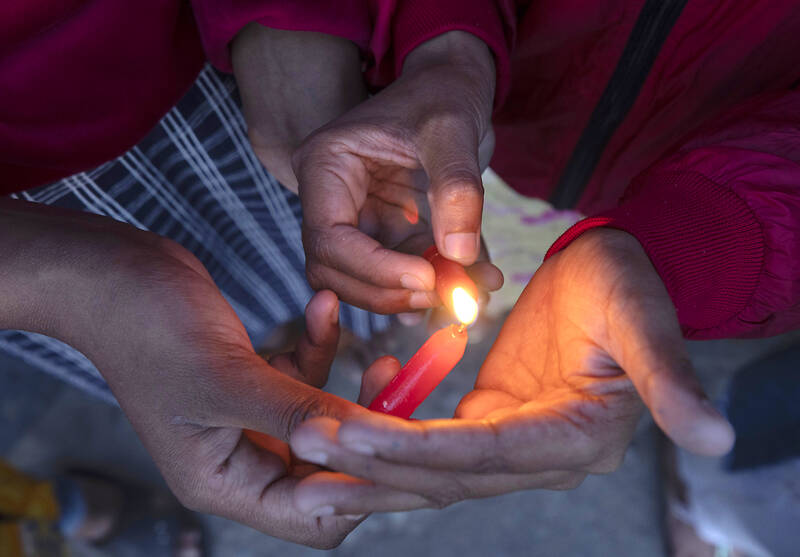Mina Chiang will give a lecture on Jan. 5 to discuss her experiences combatting human trafficking.
Chiang, the founder of UK-based Humanity Research Consultancy, will discuss her organization and how it has since its inception in 2019 adapted to changing global attitudes towards human exploitation.
The lecture, hosted by the Lung Yingtai Cultural Foundation at its offices in Taipei’s Dihua Street, is titled Empowerment & Impact: My Social Enterprise Journey and runs from 7:30pm to 9pm.

Photo: EPA-EFE
According to the United Nations Office on Drugs and Crime’s (UNODC) Global Report on Trafficking in Persons last year, cross-border trafficking fell significantly in 2020, with national reports suggesting “mobility restrictions resulting from COVID-19 containment measures may have contributed to this trend.”
Anecdotal evidence, the report says, from 2021 saw a furtherance of this trend, though lockdown measures may have simply pushed exploitation into less visible locations.
VICTIMS
The most common form of human trafficking is forced labor (38.8 percent), followed by sexual exploitation (38.7 percent). The victims of sexual exploitation are predominantly women and girls, and in some countries women make up the largest proportion of traffickers.
In some parts of the world, women trafficking women is the norm.
The report says that women and children face more violent exploitation. Female victims (women and girls) account for 60 per cent of the total number of detected victims in 2020.
BRIDGING THE GAP
With a mission to bridge the gap between clients from the global north and young professionals from the global south, Chiang’s consultancy has evolved over four years.
The consultancy is currently advising and assisting international stakeholders, including Interpol and the UNODC, and collaborating with a diverse array of international NGOs in their initiatives to end human trafficking.
The lecture and discussion will be held in English. The salon is free, but those wanting to attend must pre-register.
To register for the in-person discussion, visit: www.surveycake.com/s/zLvYY
The talk will also be screened live on Facebook. To register, go to: fb.me/e/1Lh65u3Ft
207, Sec 1, Dihua St, Taipei City (台北市大同區迪化街一段207號)
Jan. 5 from 7:30pm to 9pm.

The Taipei Times last week reported that the rising share of seniors in the population is reshaping the nation’s housing markets. According to data from the Ministry of the Interior, about 850,000 residences were occupied by elderly people in the first quarter, including 655,000 that housed only one resident. H&B Realty chief researcher Jessica Hsu (徐佳馨), quoted in the article, said that there is rising demand for elderly-friendly housing, including units with elevators, barrier-free layouts and proximity to healthcare services. Hsu and others cited in the article highlighted the changing family residential dynamics, as children no longer live with parents,

It is jarring how differently Taiwan’s politics is portrayed in the international press compared to the local Chinese-language press. Viewed from abroad, Taiwan is seen as a geopolitical hotspot, or “The Most Dangerous Place on Earth,” as the Economist once blazoned across their cover. Meanwhile, tasked with facing down those existential threats, Taiwan’s leaders are dying their hair pink. These include former president Tsai Ing-wen (蔡英文), Vice President Hsiao Bi-khim (蕭美琴) and Kaohsiung Mayor Chen Chi-mai (陳其邁), among others. They are demonstrating what big fans they are of South Korean K-pop sensations Blackpink ahead of their concerts this weekend in Kaohsiung.

Oct 20 to Oct 26 After a day of fighting, the Japanese Army’s Second Division was resting when a curious delegation of two Scotsmen and 19 Taiwanese approached their camp. It was Oct. 20, 1895, and the troops had reached Taiye Village (太爺庄) in today’s Hunei District (湖內), Kaohsiung, just 10km away from their final target of Tainan. Led by Presbyterian missionaries Thomas Barclay and Duncan Ferguson, the group informed the Japanese that resistance leader Liu Yung-fu (劉永福) had fled to China the previous night, leaving his Black Flag Army fighters behind and the city in chaos. On behalf of the

I was 10 when I read an article in the local paper about the Air Guitar World Championships, which take place every year in my home town of Oulu, Finland. My parents had helped out at the very first contest back in 1996 — my mum gave out fliers, my dad sorted the music. Since then, national championships have been held all across the world, with the winners assembling in Oulu every summer. At the time, I asked my parents if I could compete. At first they were hesitant; the event was in a bar, and there would be a lot